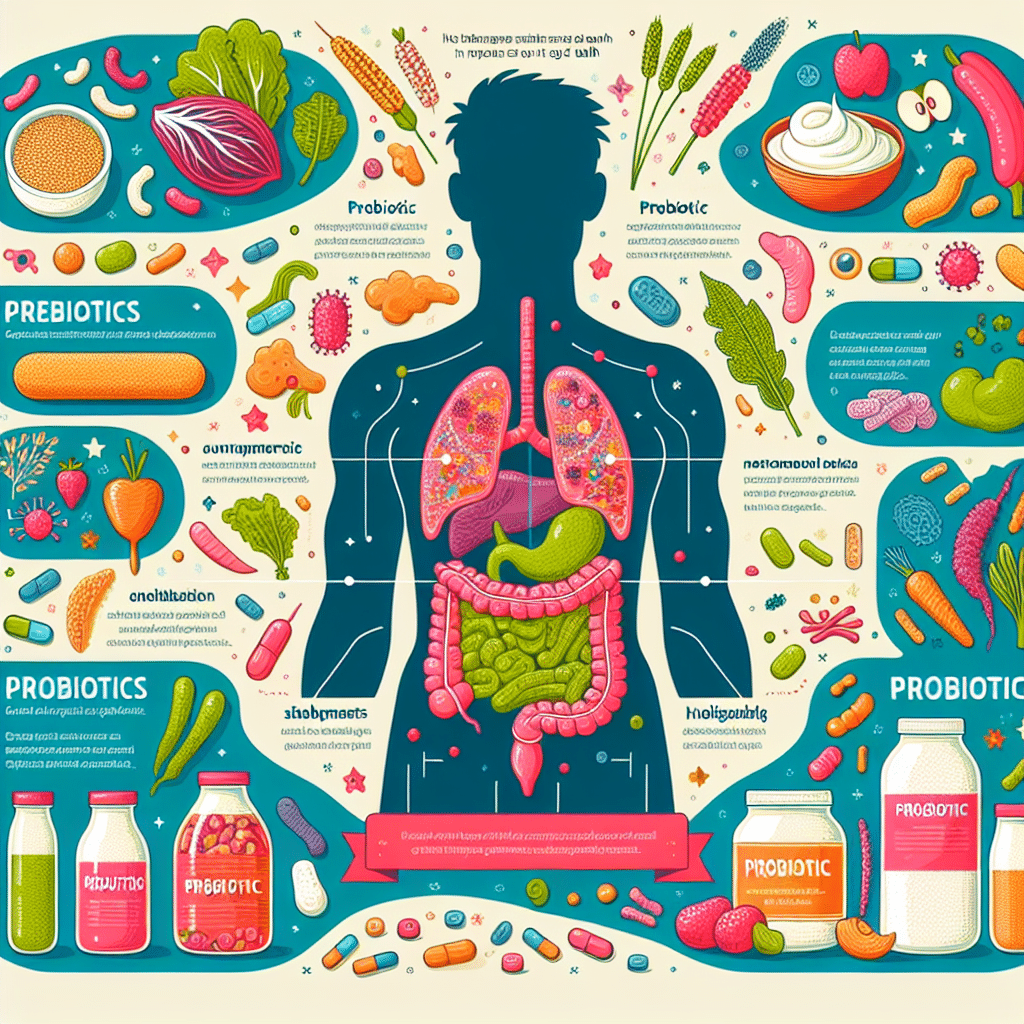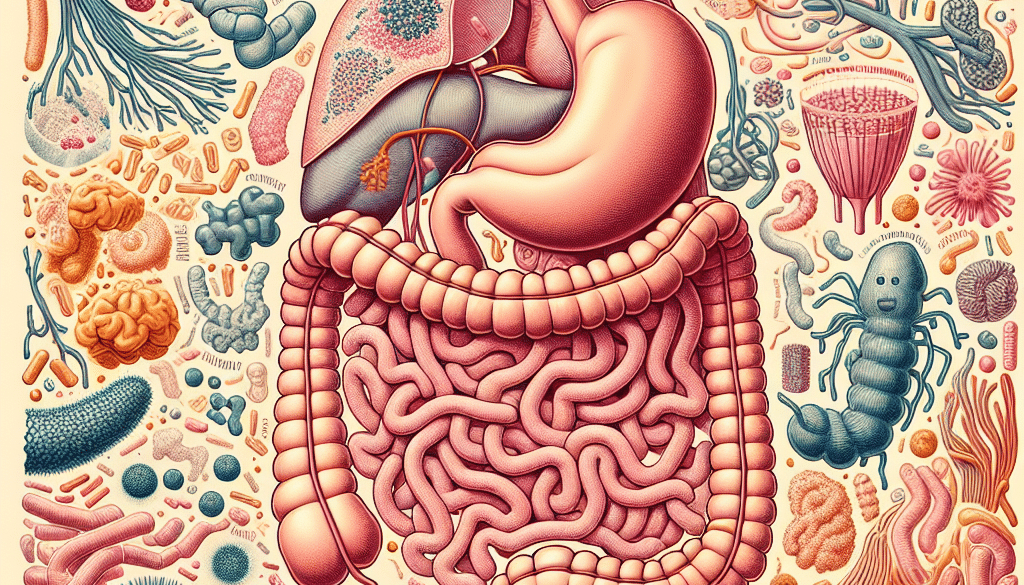Gut Microbiome Health: Prebiotics and Probiotics’ Role
-
Table of Contents
- Gut Microbiome Health: Understanding the Role of Prebiotics and Probiotics
- The Gut Microbiome: A Brief Overview
- Probiotics: The Beneficial Bacteria
- Prebiotics: Fuel for the Microbiome
- Synergy of Prebiotics and Probiotics: The Synbiotic Relationship
- Case Studies and Statistics: Evidence of Efficacy
- Incorporating Prebiotics and Probiotics into Your Diet
- Conclusion: The Importance of Prebiotics and Probiotics for Gut Health
- ETChem’s Protein Products: Supporting Your Gut Health Journey
Gut Microbiome Health: Understanding the Role of Prebiotics and Probiotics

The human gut microbiome is a complex and dynamic ecosystem, home to trillions of microorganisms that play a crucial role in our overall health. The balance of these microorganisms can affect everything from digestion and nutrient absorption to immune function and even mood. As research continues to uncover the extensive impact of gut health, the importance of prebiotics and probiotics has come to the forefront. This article delves into the roles of prebiotics and probiotics in maintaining a healthy gut microbiome and how they can be incorporated into our daily lives.
The Gut Microbiome: A Brief Overview
The gut microbiome consists of bacteria, viruses, fungi, and other microscopic living things that are found in the digestive tract. Each individual’s microbiome is unique, influenced by factors such as genetics, diet, environment, and lifestyle. A healthy gut microbiome is characterized by a diverse and balanced community of these microorganisms, which work together to support various bodily functions.
Probiotics: The Beneficial Bacteria
Probiotics are live microorganisms that, when administered in adequate amounts, confer a health benefit on the host. They are often referred to as “good” or “friendly” bacteria because they help keep the gut healthy. Probiotics can be found in fermented foods like yogurt, kefir, sauerkraut, and kimchi, as well as in dietary supplements.
- Health Benefits of Probiotics: Probiotics can help balance the gut microbiome, which in turn can lead to improved digestion, enhanced immune function, and reduced inflammation.
- Strains Matter: Different strains of probiotics have different effects. For example, Lactobacillus and Bifidobacterium are two well-studied genera of probiotics that have been shown to support gut health.
- Supporting Research: Numerous studies have demonstrated the positive effects of probiotics on conditions such as diarrhea, irritable bowel syndrome (IBS), and certain allergic disorders.
Prebiotics: Fuel for the Microbiome
Prebiotics are non-digestible food components that selectively stimulate the growth or activity of beneficial microorganisms in the gut. They are essentially the “food” for probiotics. Prebiotics are found in high-fiber foods such as fruits, vegetables, and whole grains.
- Types of Prebiotics: Common prebiotics include inulin, fructooligosaccharides (FOS), and galactooligosaccharides (GOS).
- Health Benefits: By promoting the growth of good bacteria, prebiotics can enhance gastrointestinal health, improve calcium absorption, and potentially reduce the risk of certain diseases.
- Prebiotic-Rich Foods: To increase prebiotic intake, include foods like bananas, onions, garlic, leeks, asparagus, and whole grains in your diet.
Synergy of Prebiotics and Probiotics: The Synbiotic Relationship
When prebiotics and probiotics are combined, they form a synbiotic relationship, working together to enhance gut health more effectively than either could alone. Synbiotics can be particularly beneficial in restoring the gut microbiome after it has been disrupted by antibiotics or illness.
Case Studies and Statistics: Evidence of Efficacy
Several case studies and research findings highlight the positive impact of prebiotics and probiotics on gut health:
- A study published in the Gut journal found that probiotics significantly altered the composition of gut microbiota and had a beneficial effect on the immune system.
- Research in the Journal of Clinical Gastroenterology showed that prebiotics could improve IBS symptoms and enhance quality of life for patients.
- Statistics from the National Institutes of Health suggest that probiotics and prebiotics may play a role in preventing or treating diseases such as obesity, type 2 diabetes, and even certain cancers.
Incorporating Prebiotics and Probiotics into Your Diet
Maintaining a diet rich in prebiotics and probiotics is key to supporting gut microbiome health. Here are some tips for incorporating these beneficial nutrients into your daily routine:
- Include a variety of fermented foods in your diet to get a range of probiotic strains.
- Eat plenty of high-fiber foods to naturally boost your prebiotic intake.
- Consider taking a high-quality probiotic supplement, especially if you have specific health concerns or dietary restrictions.
- Stay hydrated and limit the intake of processed foods, which can negatively impact gut health.
Conclusion: The Importance of Prebiotics and Probiotics for Gut Health
In conclusion, prebiotics and probiotics play essential roles in maintaining a healthy gut microbiome. By understanding their functions and incorporating them into our diets, we can support our digestive health, immune system, and overall well-being. As research continues to evolve, the potential benefits of these powerful nutrients will become even more apparent, solidifying their place in a holistic approach to health.
ETChem’s Protein Products: Supporting Your Gut Health Journey
If you’re looking to support your gut health with high-quality protein products, ETChem offers a range of collagen supplements that can complement your prebiotic and probiotic intake. Collagen peptides are known for their gut-healing properties and can be a valuable addition to your gut health regimen.
ETChem’s collagen products are sourced from the finest materials and undergo rigorous quality control to ensure that you receive the best possible product. Whether you’re looking for marine, bovine, or chicken collagen, ETChem has a solution to meet your needs. Their products are perfect for those involved in sports nutrition, weight management, and general health and wellness.
For more information on how ETChem’s protein products can support your gut microbiome health, please contact them at karen(at)et-chem.com.
About ETChem:
ETChem, a reputable Chinese Collagen factory manufacturer and supplier, is renowned for producing, stocking, exporting, and delivering the highest quality collagens. They include marine collagen, fish collagen, bovine collagen, chicken collagen, type I collagen, type II collagen and type III collagen etc. Their offerings, characterized by a neutral taste, instant solubility attributes, cater to a diverse range of industries. They serve nutraceutical, pharmaceutical, cosmeceutical, veterinary, as well as food and beverage finished product distributors, traders, and manufacturers across Europe, USA, Canada, Australia, Thailand, Japan, Korea, Brazil, and Chile, among others.
ETChem specialization includes exporting and delivering tailor-made collagen powder and finished collagen nutritional supplements. Their extensive product range covers sectors like Food and Beverage, Sports Nutrition, Weight Management, Dietary Supplements, Health and Wellness Products, ensuring comprehensive solutions to meet all your protein needs.
As a trusted company by leading global food and beverage brands and Fortune 500 companies, ETChem reinforces China’s reputation in the global arena. For more information or to sample their products, please contact them and email karen(at)et-chem.com today.




